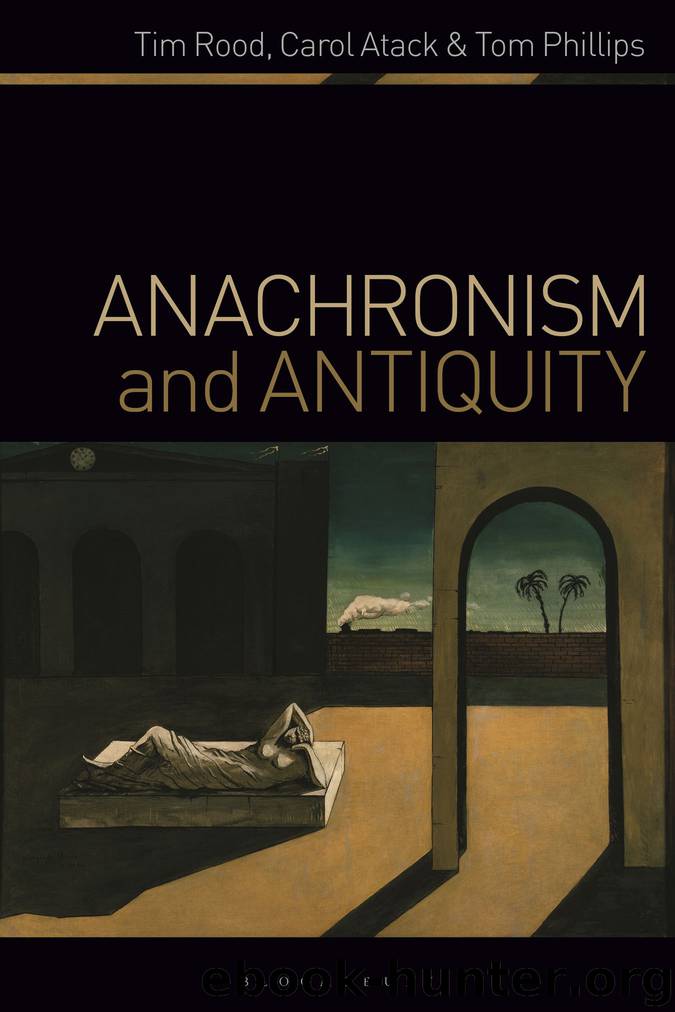Anachronism and Antiquity by Tim Rood;Carol Atack;Tom Phillips;

Author:Tim Rood;Carol Atack;Tom Phillips;
Language: eng
Format: epub
ISBN: 9781350115217
Publisher: Bloomsbury UK
Published: 2019-11-25T16:00:00+00:00
Anachronism incorporated
The idealized simplicity of the past was not simply treated with nostalgia or for satire. The possibility of its incorporation in political structures in the present was a recurrent strain in political theories structured around the contrast between simplicity and luxury. Continuing tradition was valued because of its links to the ancient simplicity, while constitutions which were thought to have resisted development into more complex forms were taken up as a means of contemplating alternative forms of social organization: in Athens, for instance, the construction of Sparta, and later Crete, as anachronistic survivals was employed to criticize democracy.73
Anachronism could be incorporated, too, through ethical systems focused on individual self-sufficiency. When Plato historicized the simple life of the Cyclopes, he was responding to the Socratic Antisthenes, who suggested that life offered a better route to justice than was possible in cities (SSR V A 189A).74 Owing to his advocacy of the simple life, Antisthenes was later claimed as founder by the Cynics, who presented themselves as rejecting the corruption of the city and returning to the ennobling hardship of the past. Staged encounters between the city and the anachronistic barbarian were one way Cynics developed their critique of luxury. One writer used the voice of the Scythian sage Anacharsis to assert the value of the simple life: ‘A Scythian cloak is my covering, the skin of my feet are shoes, the whole earth is bed, milk, cheese and roasted meat are dinner and breakfast, to drink I have water’ (Epistles of Anacharsis 5).75 Lucian even places Anacharsis in dialogue with Solon, contrasting the developed practices of Athenian society with the primitive Scythian life. The Scythian sage is bewildered by the exercises performed by youths at the gymnasium and by their lack of weapons (37.34) – a nod to one of the signs of development identified by Thucydides.
Beyond Greek philosophy, the ethnographic construction of anachronism shaped and was shaped by changing relations between Rome and Italy. Comparing the way that Scottish Highlanders came to be valorized in retrospect following the failure of the 1745 uprising, Emma Dench has argued that shifts in Roman perceptions of Italy can be understood in terms of the incorporation of the primitive.76 Inhabitants of areas such as Samnium, who had initially been marginalized in Roman perceptions as barbarian or primitive, came in the course of the second century BC and especially after the Social Wars at the start of the first to be valued as sturdy farmers, retaining severe ancient customs after these had been abandoned in metropolitan Rome.77
The ideological significance of this construction of the Italian is fully realized in Virgil’s Aeneid. In the catalogue of Aeneas’ Italian enemies in Book 7, Virgil offers variations on ethnographic tropes of hardness. One of the Italian leaders, Ufens, is presented as coming from a mountainous area with hard turf and as leading a tribe that is ‘especially rough (horrida) and used to frequent hunting in the forests’: ‘The men work the land armed and their pleasure is always to carry off new booty and to live off plunder’ (7.
Download
This site does not store any files on its server. We only index and link to content provided by other sites. Please contact the content providers to delete copyright contents if any and email us, we'll remove relevant links or contents immediately.
| Ancient & Classical | Arthurian Romance |
| Beat Generation | Feminist |
| Gothic & Romantic | LGBT |
| Medieval | Modern |
| Modernism | Postmodernism |
| Renaissance | Shakespeare |
| Surrealism | Victorian |
4 3 2 1: A Novel by Paul Auster(12393)
The handmaid's tale by Margaret Atwood(7767)
Giovanni's Room by James Baldwin(7347)
Big Magic: Creative Living Beyond Fear by Elizabeth Gilbert(5775)
Asking the Right Questions: A Guide to Critical Thinking by M. Neil Browne & Stuart M. Keeley(5775)
Ego Is the Enemy by Ryan Holiday(5450)
The Body: A Guide for Occupants by Bill Bryson(5098)
On Writing A Memoir of the Craft by Stephen King(4945)
Ken Follett - World without end by Ken Follett(4734)
Adulting by Kelly Williams Brown(4576)
Bluets by Maggie Nelson(4559)
Eat That Frog! by Brian Tracy(4542)
Guilty Pleasures by Laurell K Hamilton(4450)
The Poetry of Pablo Neruda by Pablo Neruda(4110)
Alive: The Story of the Andes Survivors by Piers Paul Read(4033)
White Noise - A Novel by Don DeLillo(4012)
Fingerprints of the Gods by Graham Hancock(4005)
The Book of Joy by Dalai Lama(3986)
The Bookshop by Penelope Fitzgerald(3854)
